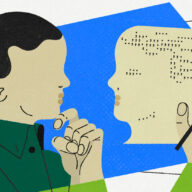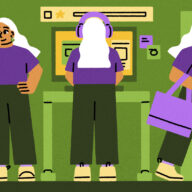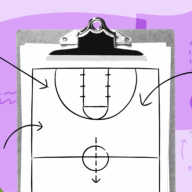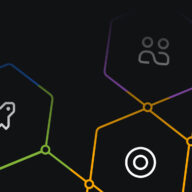If a coworker had feedback for you, would you rather they say it to your face, or do you prefer to receive it anonymously? Today’s debate challenges you to think again about the best way to critique your colleagues.
Debater Rani Shah defends direct feedback, with support from Know Your Team’s CEO Claire Lew, who unpacks the cultural consequences of anonymous feedback. And Marshall Walker Lee argues in favor of anonymous feedback, with help from HR pro Osasu Arigbe, who shares a story of direct feedback gone very wrong.
Episode References
-
Anonymous feedback breeds distrust (Know Your Team)
https://knowyourteam.com/blog/2017/12/01/anonymous-employee-feedback-breeds-a-culture-of-distrust/ - Diversity, inclusion and anonymous feedback: https://inkrement.io/blog/diversity-inclusion-and-anonymous-feedback/
- Comparing how critical feedback is when delivered in identifiable form vs anonymous form: https://www.ncolr.org/jiol/issues/pdf/6.2.2.pdf
- Online disinhibition effect: https://www.uh.edu/news-events/stories/2014/January/12114Santana.php#:~:text=At%20play%20is%20the%20so,consequences%2C%20thus%20their%20inhibitions%20drop.
Transcript
Christine Dela Rosa:
Hey, welcome to Work Check, an original podcast from Atlassian, where we take everyday workplace practices and debate if they’re actually working for us. Today, we’re asking, should feedback between colleagues always be given directly? I’m your host, Christine Dela Rosa, who has been known to ask for feedback on how she feedbacks.
Marshall Lee:
Turtles all the way down.
Rani Shah:
I don’t know what that means, but sure.
Christine Dela Rosa:
Joining me today to debate this question, we have Rani Shah in defense of direct feedback. Rani lives in New York City, so it should come as no surprise that she’s a hard and fast fan of direct feedback.
Rani Shah:
That’s right, Christine. Here for direct feedback all day, every day – including about New York. We need to stop throwing trash in the subways!
Christine Dela Rosa:
And debating Rani today is Marshall Walker Lee, who is most definitely not a New Yorker.
Marshall Lee:
No, Christine. I was raised in the Upper Midwest, where we are conditioned to be as indirect and passive aggressive as possible. So, frankly, I just think it’s really neat that Rani is willing to defend something as ineffective as direct feedback. That’s just super for her.
Christine Dela Rosa:
Okay. Okay. Before we get started, I just want to make sure we’re on the same page about out what kinds of feedback we’re talking about. We’re talking about feedback from one colleague to another. Now, direct feedback comes with names attached. The alternative is anonymous feedback, which could be given through an anonymous platform, or even like the telephone game through a coworker or a manager. As your judge, I’m listening to hear your best anecdotes and evidence to convince me of your side. And at the end, I’ll crown one of you the winner.
Rani Shah:
I love crowns.
Marshall Lee:
Let’s do it.
Christine Dela Rosa:
Rani, you start us off. Tell us, why should feedback always be given directly?
Rani Shah:
All right. I’m going to dig into it. So I’m a big believer in direct feedback. And my first major argument is super simple. It’s better for the team culture.
Christine Dela Rosa:
Hmm.
Rani Shah:
So let me ask you two. You guys watch sports?
Christine Dela Rosa:
No.
Marshall Lee:
I was recently surprised to learn that the Super Bowl still happens.
Rani Shah:
I’m not a big sports watcher myself, however, I did just finish watching Ted Lasso.
Christine Dela Rosa:
I watched that.
Marshall Lee:
Yeah, me too.
Rani Shah:
That’s my reference point. Now, if you haven’t seen it: A, I highly recommend it. But B, the show’s about an American football coach and he goes to the UK to coach English football, or what we Americans like to call soccer. But really, the show is about teamwork.
Christine Dela Rosa:
Totally.
Rani Shah:
And to build a strong team dynamic, the players give each other feedback all time. And it’s always direct. You don’t see them writing up anonymous chits saying, “Tell the goalie that they need to work on their game,” or, “Hey, that guy sucks.” The point is the coach can’t be on the field all the time with them.
Christine Dela Rosa:
Right.
Rani Shah:
And so a strong team needs to be able to give each other specific, direct feedback in whatever moment they need. The same is true on any team, including mine. Direct feedback is essential to create a strong trusting team dynamic, not just for today, but for the long term. And to talk more about benefits of direct feedback I want to loop in my amazing guest, Claire Lew, CEO of Know Your Team, a company that builds software to help leaders lead better.
Claire Lew:
So oftentimes, you’ll have two folks who feel like they are oil and water. This person isn’t high level enough and strategic enough, this person is too abrupt, too aggressive. And what’s amazing is when you actually give people space to give feedback about, “Hey, I noticed that you happened to do this in a meeting and this is how that came across,” and when that understanding is made, it’s almost like you’re building a physical bridge of two worlds where the other person’s like, “Oh. Oh, I see. The reason you communicate so aggressively is because you’re excited.” And it’s just this giant light bulb moment that happens when you’re able to give that feedback directly.
Rani Shah:
It’s this opportunity she talks about, the opportunity to connect and understand each other better. So you’re basically saying, “Hey, you’re my teammate. I respect you enough to tell you what needs to be worked on for us to collaborate better.” And when feedback is anonymous, it’s very easy for it to twist into this culture of distrust. Here’s Claire.
Claire Lew:
I think when we feel tempted to give anonymous feedback, it’s actually an indication of a larger problem. It’s a potential signal that there isn’t enough trust in the relationship to be open and honest.
Rani Shah:
Claire brought up one type of anonymous feedback that’s pretty common, triangulated feedback. This is where instead of giving feedback directly, I give it to my manager and they give it to my colleague, without my name attached.
Claire Lew:
So you hear feedback about yourself or your work, not from someone directly, but from the grapevine. You’re not sure exactly who, but maybe it’s someone on this team and they told someone, and they told someone else, and then now you’re hearing it. And so for the managers, usually the way this manifests is someone comes to you and they say, “Hey, could you give this person this feedback about their work? But don’t tell them it was me.”
Rani Shah:
So Claire gave a great example of this, of triangulated feedback, that we can all relate to; a colleague that unfortunately has some pretty bad BO.
Christine Dela Rosa:
Oh, no.
Claire Lew:
How do you share that? That’s a tough one. So the manager goes in and says, “Okay, I’ve got to tell this person this.” So I’m going to say that “Something that was brought to my attention was that you smell.” Whew. Can you imagine how difficult that is to share? Or if the person starts to think, “Wait, who thought this? How many people think it? Is this the whole company? Is this something that’s been talked about in Slack DMs and on back channels?”
Rani Shah:
So whether it’s BO or just, “Hey, you talk too fast,” if you really want to build a healthy team dynamic, direct feedback is the way to go.
Christine Dela Rosa:
I am very glad to not be the manager in that triangle. Way to appeal to my fears, Rani. Marshall, how do you counter this idea, that anonymous feedback is going to harm the team dynamic?
Marshall Lee:
Yeah, there’s so much to dig into there. And I want to get into what kind of feedback actually produces stronger, more resilient teams in a little while. First, I want to talk about Rani’s suggestion here that giving and receiving feedback is inherently emotional.
Christine Dela Rosa:
Hmm.
Marshall Lee:
I don’t care how enlightened you are. When you get criticized, especially about the way you smell, you’re going to feel bad.
Christine Dela Rosa:
Yeah.
Rani Shah:
Yeah.
Marshall Lee:
This is just human nature. Inevitably, your feelings are going to have a really big impact on how you process the feedback you receive, and then what you do with that feedback. Now, when someone criticizes our work, even if they do it politely, it triggers something inside of a part of our brain called our amygdala.
Marshall Lee:
Now, the amygdala is the thing that creates the flight or fight response. It’s a little almond shaped section of the brain that’s responsible for regulating strong emotions, like fear and anxiety. And the amygdala has a really important job to do.
Marshall Lee:
When it thinks you’re scared, it fills your body with stress hormones. Your hands get sweaty. Your muscles tenses up. Your heart starts to pound. Now, the problem is the amygdala doesn’t know the difference between a life-threatening shark attack and a tough conversation with a coworker.
Christine Dela Rosa:
You’re basically describing all my interactions with people.
Marshall Lee:
Okay. Well, the real question for us then is, what do we do about that? Well, one thing we can do is create systems that make it easier for our rational brains, for our logical side to stay in control and to do the right thing. And I believe that indirect, anonymous feedback allows us to focus on the signal, the data, the information inside of the feedback, what’s actually being said about our performance, rather than all of the emotional noise. We should always be focusing on the message in the feedback, not the messenger.
Marshall Lee:
And there’s just so many things that can distract us when we’re receiving direct face-to-face feedback; somebody’s posture, their tone of voice, their volume, their speaking style. And this brings me back to Rani’s point about distrust and paranoia in the workplace. Yes, receiving feedback anonymously might make you feel paranoid, but direct feedback on the wrong day or delivered in the wrong way can make you attach your negative emotions to a specific individual, rather than just hearing the information inside of the feedback.
Christine Dela Rosa:
Huh.
Marshall Lee:
That can create awkwardness at best, and at worst, open hostility and bitterness. So in a world of trade-offs, personally, I would choose a little bit of paranoia over open tension in the workplace. So honestly, if you’re receiving the kind of negative feedback that makes you feel paranoid, maybe you’re better off not knowing who wrote it. Sometimes ignorance is bliss.
Christine Dela Rosa:
I can certainly relate to that. I love that you said, Marshall, that it’s a world of trade-offs. Because honesty, I relate to both what Rani was saying about having this paranoia, but on Marshall’s side, I also relate to the fight or flight response that comes with having really tough conversations face-to-face. So, because I’m still on the fence here, obviously, let’s keep going! Rani, give us another round for the direct feedback side.
Rani Shah:
Love it. So I’m obsessed with the fact that Marshall is throwing in the amygdala. Amazing choice.
Marshall Lee:
Oh, we’re bringing the science facts today.
Rani Shah:
Love the science facts. And he’s absolutely right. The flight or fight response is activated there when you’re under a threat. But in my experience, it’s a lot more threatening to hear, “Someone said this about you,” than it is to hear that same feedback with a name attached to it, with context added. And that leads me to my next point, which is the context you get with direct feedback makes the feedback more actionable.
Rani Shah:
This is exactly my problem with anonymous feedback. To make it anonymous, we remove all the useful specifics. And the ‘who’ part of the context is super important to understand how heavily to weigh that piece of feedback. So I was talking to a friend about this podcast and an example she gave was, we had a situation at work and her colleague was given anonymous feedback about various things. But one of them that her hurt to the point of tears was –
Christine Dela Rosa:
Oh, no.
Rani Shah:
… someone telling them that they don’t think their career goals are viable or reachable.
Christine Dela Rosa:
Oh, boo.
Rani Shah:
And it came from an anonymous source. If they had decided to give it directly, it would’ve come with all sorts of useful context and information. Is it coming from someone who barely knows this person or her work? Or, say it came from a close colleague who wanted to keep it anonymous.
Rani Shah:
Maybe to make it anonymous, they took really important and relevant details that would give away who even said it. You need examples with feedback, specifics to know when, where, how this behavior even happened in order for change to occur. Anonymous feedback also deprives the person receiving feedback from asking any followup questions.
Christine Dela Rosa:
No. No, that makes sense. That makes sense. I’m thinking about the first time when I got feedback that I disagreed with. It was my first job – I’m going to take you back – I was told that I needed to add more focus to some of my meetings. And my manager at the time interpreted that as, you need to goof off less, Christine.
Christine Dela Rosa:
Now, if you know me, I have to proactively compensate for my tendency to be all business. So when I heard this note, I kept asking, when has this happened? What did I do? And I wanted to ask followup questions, but there was no one on the other end of that feedback.
Marshall Lee:
Interesting.
Rani Shah:
Oh, man. Well, for what it’s worth, Christine, that’s actually my favorite part of being in meetings with you.
Christine Dela Rosa:
Oh.
Rani Shah:
So this leads to my next point. It’s really important to know what feedback to take seriously, and when. I think it’s a lot easier on the amygdala, Marshall, when you know the specifics. Like oh, I interrupted this one colleague this one meeting, versus I interrupt everyone all the time. In this scenario, you know what the problem is, how seriously to take the feedback, and what to really do about it.
Christine Dela Rosa:
Okay. Got it. I can totally buy that. What about you, Marshall? Can you?
Marshall Lee:
Yeah, that’s interesting. I think honestly, I disagree with Rani’s last point there. I think that I view feedback fundamentally as data. Any piece of data is potentially valuable and ultimately, it’s up to you to decide which data you want to prioritize and act on.
Rani Shah:
Interesting. So I respectfully and totally disagree with that.
Marshall Lee:
Hmm.
Rani Shah:
In my opinion, feedback is subjective. Data is objective. To give someone’s opinion on you, the equivalency of a data point, I think that’s inherently flawed.
Christine Dela Rosa:
Huh.
Marshall Lee:
Okay. Interesting. Maybe this is a fundamental disagreement between you and I. I don’t think we should take a piece of feedback more or less seriously because it has one name and not another name attached to it.
Christine Dela Rosa:
Yeah.
Marshall Lee:
Some of the best feedback I’ve received has been from coworkers who I frankly didn’t like, who I thought were mean or cruel or stupid, but they had a single piece of incisive feedback for me. Maybe it wasn’t delivered in a way I would’ve appreciated, or at a time that I appreciated, but I saw the truth in what they were saying and it helped me improve. And I think that’s what we’re trying to do with feedback, not help each other feel good.
Marshall Lee:
But I think honestly, all of this is great because now we’re getting to the real heart of the issue, which in my opinion is all about personal growth and development. Because that’s the real purpose of feedback, right? To help us improve.
Christine Dela Rosa:
Mm-hmm.
Marshall Lee:
And numerous studies have shown that organizations that provide channels for anonymous feedback perform better than their counterparts. And in fact, they build healthier, more resilient cultures.
Christine Dela Rosa:
You know I love a study.
Marshall Lee:
I know you do. So this study is in the Journal of Interactive Online Learning and it showed that anonymous peer feedback is more objective and importantly, more critical than direct feedback. People are meaner, for lack of a better word, in anonymous feedback.
Christine Dela Rosa:
Yeah.
Marshall Lee:
However, this is getting back to this hard problem of improvement. It’s that critical feedback that actually helps us improve. And so anonymous feedback is correlated with a much larger performance improvement over time, both in individuals and in teams.
Christine Dela Rosa:
That resonates with me, because when I get feedback to people versus when I anonymously provide it, I’m way softer. And I am reading their cues, seeing how I’m affecting them, and making sure that they’re okay as I give them the feedback, which is very different from anonymous feedback where I won’t hold back because I’m not reacting to all of that.
Marshall Lee:
Yeah. And I’m certainly not advocating for cruelty in the feedback.
Christine Dela Rosa:
No.
Marshall Lee:
I think we should expect everyone to behave responsibly when they’re giving feedback directly or anonymously. But I think that what we want from feedback at the ground level is as much honesty as any one person giving us feedback can possibly supply. And I also want to make it clear, I’m not saying that we should eliminate direct feedback. Direct feedback also has a place. I’m just advocating for options. And anonymous feedback isn’t some radical innovation. I’m not trying to change the way that we’re doing this.
Marshall Lee:
Anonymous feedback has been a critical driver of intellectual and social progress pretty much since the beginning of time. Think about academic disciplines where peer reviews are done anonymously. This produces better, more rigorous science. And we’re granted anonymity when we vote, when we report crimes. Even The Federalist papers, which basically launched the whole American experiment, were written anonymously. Although now we know they were mostly written by … Christine, what’s his name?
Christine Dela Rosa:
Hamilton.
Marshall Lee:
His name is Alexander Hamilton. That’s right. The bottom line here is anonymous feedback works. Sometimes it works better than direct feedback and there’s a place for it at work.
Christine Dela Rosa:
Marshall, so, so many points in that one response. It’s funny to think about anonymous feedback as in a way, more direct, because people aren’t sugar coating it. How do you feel about that, Rani?
Rani Shah:
Definitely. Anonymous feedback can definitely be more critical. You’re right. There is no sugar coating to it. Critical feedback is a good thing. However, with anonymous feedback, that can easily slide from being critical to cruel.
Christine Dela Rosa:
Oh, yeah.
Rani Shah:
Which brings me to my third point. Because you don’t have that face-to-face accountability that direct feedback provides you, empathy is now able to leave the building.
Christine Dela Rosa:
Yeah.
Rani Shah:
So I’ve worked in social media for a large part of my life and everyone knows that online, anonymity can be a dangerous force. It creates the Reddit trolls, the YouTube commenters, people who hide behind an avatar. And there’s this effect called the online disinhibition effect. Basically, people are super comfortable saying things online that they would never say in real life.
Christine Dela Rosa:
Oh, yeah.
Rani Shah:
Yeah. Hashtag Tinder swindler. And sure, the workplace is not the internet, but I do think anonymity can create the same type of disinhibition. So Christine, you said before that when you’re giving feedback, you don’t hold back as much. And you’re a nice person.
Christine Dela Rosa:
Oh, thanks.
Rani Shah:
So I’m sure you not holding back is still a civil and generous and kind form of feedback.
Christine Dela Rosa:
Aw, I try.
Rani Shah:
But that’s not true for everyone. For some people, anonymity is a chance for them to lash out and say things they would never say if they’re looking at someone in the eye, or if their name is attached. Basically, it gives people a chance to be petty, over constructive.
Christine Dela Rosa:
Hmm.
Rani Shah:
So to keep things civil, making it direct, AKA not anonymous is really, really important. Let me give an example. People might be disinhibited from saying something that is totally inappropriate in the workplace. Let’s say you get a piece of anonymous feedback that felt sort of misogynistic. Like, “You need to smile more. You’re being too aggressive.”
Marshall Lee:
Oof.
Rani Shah:
Who do you tie that back to? Who do you report? At least when it’s direct, we can trace that back and have a conversation. Or if necessary, a termination.
Christine Dela Rosa:
Yeah, that’s an interesting point. Anonymity can have the dangerous side effects that might make people feel a lot less accountable. Tracks. Marshall, what do you think about that?
Marshall Lee:
Well, I totally agree with Rani that at work, even in a large team environment, we should feel constrained – in a good way – by the relationships that we have with our coworkers. When it comes to feedback, if everybody is drinking from one big well, so to speak, then when that gets poisoned, everyone suffers. And I’d like to believe that the sort of misogynistic idiots who are going to give that feedback anonymously would probably also be saying it directly.
Rani Shah:
I feel you.
Marshall Lee:
But I think we should dig into the flip side of that. What happens when people have strong reactions to feedback that isn’t malicious or bigoted and as a result, the person giving honest, considered feedback suffers? One of the things that’s so valuable about anonymous feedback is that it protects vulnerable members of the team and gives them an opportunity to say something honestly that they might not feel empowered to say if their name was attached to it.
Marshall Lee:
So Rani, you and I are very direct people. We’re comfortable having these conversations. We’re here arguing on a podcast, right, but not everybody communicates like us. And for lots of people – people who are introverted or people with less status or seniority, people who are anxious about confrontation, people who already feel marginalized or at risk – giving direct feedback often just isn’t worth the risk. So they just say nothing at all and then everybody loses.
Marshall Lee:
So I think this is the perfect time to bring in my guest, Osasu Arigbe. She’s an HR professional who wrote a great piece about the way anonymous feedback affects diversity and inclusion at work. And she told me a story about a past coworker of hers who gave their leadership some direct feedback about pay disparities at the company. Now, this is something everybody knew about, but nobody was speaking up. And when she gave that direct feedback, things went sideways.
Osasu Arigbe:
She felt like it was the right thing to do because the company had transparency as one of the values and an open feedback kind of culture. And the leaders acted like they appreciated the feedback and promised to commit to the necessary changes. But after a while, we noticed that she was being treated differently and made to feel uncomfortable. She was being excluded from meetings and she had to leave the company.
Osasu Arigbe:
As someone that observed everything, it made me feel very uncomfortable. And as a person of color myself, it made me realize that I shouldn’t speak up in any situation like that. If I had anything sensitive to say in the future, I just don’t say it. Or look for an anonymous way to say it.
Osasu Arigbe:
If there was anonymous feedback and everyone had that option, I think more people will have said something without any fear of retaliation.
Marshall Lee:
Yeah. So Osasu’s story is about giving feedback to leadership, not necessarily to your peers. But I think at a deeper level, giving direct feedback can have serious consequences regardless of who you’re giving it to, because it’s not just that we might get fired or ostracized. It’s that our coworkers might start treating us differently. They might start excluding us from meetings or for projects. They might start a gossip chain that makes us feel unwelcome.
Marshall Lee:
There’s all these subtle, less overt ways that giving direct feedback can produce negative consequences for the person who gave it. But anonymity levels the playing field. And again, I’m not saying all feedback has to be anonymous, but if a single person within an organization has a great, valuable piece of feedback, but isn’t sharing it because they think that giving that feedback directly could put them at risk, then I would say that alone is a strong enough argument for implementing some channel for anonymous feedback.
Christine Dela Rosa:
Right. That is a great point. And if I had to give feedback on this debate, which I do, I’d say idealistically want to see a world where Rani, your point is true for everyone and we can all give feedback directly to our teammates. But Marshall, I think that in reality, there are too many variables so we need to be able to have the anonymous option. Therefore, the official winner of this episode is Marshall!
Rani Shah:
My crown! Tough feedback is hard to swallow.
Marshall Lee:
I’ll give you some direct feedback, Christine. You made the right choice.
Christine Dela Rosa:
Thanks both. You all, if you learned as much as I did on this episode and you want to provide your own feedback on the show, please, review and rate us. Till next time, this is Work Check, an original podcast from Atlassian.









































